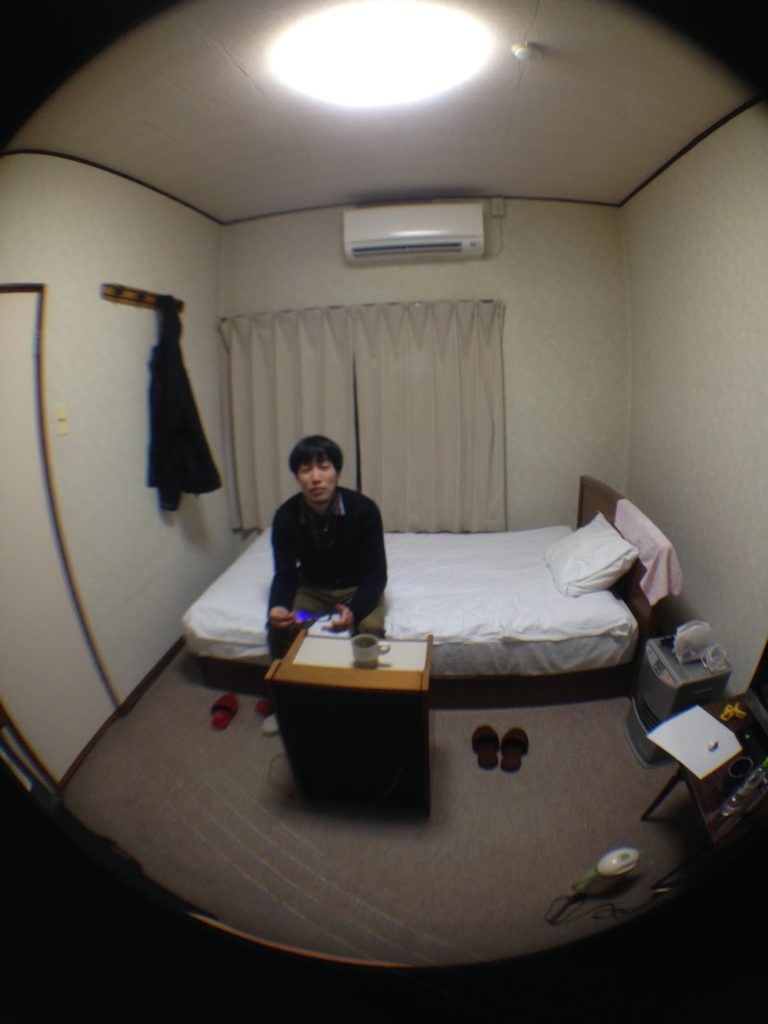
Title: Relationships of Languages and Nations
Year: 2017
Size: variable
Material/medium: Performance
Curator: Daiya Aida
Site: HoteYama biennale 2017, Aomori, Jpn
Brief outline: Language is like the flow of a river. Words flow from a strong country to another. And the flow of the river is not constant and sometimes changes by some action. It may be called the power of culture or the power of economy.
I held a Japanese to Korean language class. The students are confused as they gradually become unable to distinguish between Japanese and Korean.
Title: 言葉と国家
Year: 2017
Size: 可変
Material/medium: パフォーマンス
Site: ホテ山ビエンナーレ 2017, 青森, 日本
Curator: 会田大也
Brief outline: 言語は川の流れに似ている。強い国からそのほかの国へ言葉は流れる。そしてその川の流れは一定ではなく、時には何かの作用で変化する。それは、文化の力とも言うかもしれないし、経済の力とも言うかもしれない。
私は日本語→韓国語の語学教室を開催した。そこで教える単語は、徐々に日本語だか韓国語だかわからなくなって…。
秘すれば「ふぁな」なり
If it is hidden, it become the “Fhana 花”. -“Fu’shi kaden” Zeami, Ac15-
ある場所でしか通じない事象が特有の文化となり、他では通じないからこそ、それぞれが異質なものとして、折り重なり、独立し、世界を作ってゆく。文化としての言葉も時代や場所で断片化され、不器用につなぎ合わされ、また離されていく。
The fact that an event that is communicated only in one place becomes a unique culture and is not communicated in another makes each of them different, so that they come together, become independent and create a world. The language as a culture is also fragmented, clumsily connected and separated by time and place.
日本語と朝鮮語には、同じ発音の単語がある。例えば、洗濯機(せんたっき/せたっき)、無理(むり/むり)、有料(ゆうりょう/ゆりょ)、到着(とうちゃく/とちゃっく)、妙案(みょうあん/みょあん)、高速道路(こうそくどうろ/こそくどろ)…等々[i]。
Japanese and Korean have words with the same pronunciation. For example, “洗濯機, washing machine (Sentakki/Setaggi)”, 無理, irrational (Muri/Muli), 有料, paid (Yūryō/Yulyo), 到着, arrival (Tōchaku /Dochag), 妙案,good idea (Myōan/myoan), 高速道路, highway (Kōzokudōro/ Gosogdolo), etc.
単語だけで会話をすれば朝鮮語がわからなくても、「高速道路、有料」と辛抱強く何度か言ったり聞いたりしていれば、意味が通じる。高速道路が有料なのを力説する場面はそうそう無いとは思うが、ちょっとした旅行程度ならコミュニケーションは取れるし、お互いの類似性を発見することで親近感も湧く。
Even if you don’t understand the Korean language if you speak only with words, who can understand it if you patiently say “Gosogdolo, Yulyo” several times. I don’t think there are many occasions where people stress that expressways are toll roads, anyway they can communicate with each other if it’s just a small trip, and they feel close to each other when they discover similarities.
日本語と朝鮮語の単語は、両国とも漢字で書くことができる。漢字を元にする単語の発音は似ている。一方で、似ても似つかない単語が多いことは –辞書を引かずとも– 言葉が通じないことを以って体感的に私たちは知っている。朝鮮、中国、日本と三つの土地で、同じ漢字でも、それぞれの国の発音がある。
Both Japanese and Korean words can be written in Chinese characters. The pronunciation of words based on kanji is similar. On the other hand, we know firsthand that there are many words that are alike and dissimilar — even without a dictionary — because we can’t communicate. In Korea, China and Japan, each country has its own pronunciation of the same Chinese character.
しかしお互いの言語が通じないのは自明というのは、少し不思議な話だ。そもそも同じ中国から渡った語が、どうして異なった発音になるのか。
But it’s a bit strange that it’s self-evident that we can’t speak each other’s language. In the first place, why do words from the same China have different pronunciation?
発音の違いには、いくつかの理由があるが、ひとつには時代による発音の変化があげられる。例えば、現在の日本語の母音は「a、i、u、e、o」の5つ。しかし古語の母音は「a、i、I;、u、u;、e、o」という7種類だった。現代の言葉には「i;」と「u;」が存在しない[ii]。その2つの母音の他にも、かつての日本人が発音していた音を、現代の日本人は発音しなく/発音できなくなったものがある[iii]。それは日本だけでなく、朝鮮と中国でも同じ状況だ。
There are several reasons for the difference in pronunciation, one of which is the change in pronunciation over time. For example, the current Japanese vowels are 5 “a, i, u, e, o”. However, there were 7 vowels called “a, i, I; , u, u; , e, o” in the ancient language. In modern language, “i;” and “u;” do not exist. In addition to these two vowels, there are other vowels that Japanese today can no longer/cannot pronounce sounds that were once pronounced by Japanese. The situation is the same not only in Japan but also in Korea and China.
例えば現在の日本人は「ふぁ」を「は」に置き換えてしまった。しかしまれに千年程前の平安時代の発音も残っている。沖縄のある地域では「はな」を未だに「ふぁな」という。「ふぁな」は沖縄の言語ではなく、大和言葉が残っている状態。東北にも、平安時代から発音はおろか意味も変わらずに、いくつかの大和言葉を日常で使っている地域がある。
For example, today’s Japanese have replaced “Fha” with “ha.”. However, on rare occasions, the pronunciation from the Heian period, which was around 1000 years ago, still remains. In some parts of Okinawa, “Hana, 花” is still referred to as “Fhana”. “Fhana” is not an Okinawan own language, but a condition in which Yamato-kotoba (Japanese own language) still remains. In some areas of the Tohoku region, some Yamato-kotoba have been used on a daily basis since the Heian period, not only for pronunciation but also for meaning.
ちなみに「はな」は固有語で、漢字の「花」は後からつけたもの。固有語は輸入語ではないので、中国、朝鮮、日本でそれぞれ全く発音が異なる。どの国でも身の回りの言葉は固有語が多く、それ以外は輸入語や翻訳語が多い。
By the way, “Hana” is a proper word, and the Chinese character for ‘花’ was added later. Since the proper word is not an imported word, the pronunciation is completely different in China, Korea and Japan. In every country, there are many indigenous words around us, and other than that, there are many imported and translated words.
同じ漢字が国毎に違う発音になったのは、それぞれの土地で独立した時間をかけ、それぞれの発音を変化させたことが、大きな理由のひとつに挙げられる。
One of the main reasons why the same Chinese character was pronounced differently in each country was that the pronunciation of each character was changed over a period of independent time in each country.
例えば、昔は日韓とも「ai」と発音していた語が、今では朝鮮では「e」に変化したものがある。しかし「あい」と「え」は全く違う。今となっては全く別の言葉にしか響かない。しかし日本語でも「関係ない」を「関係ねぇ」と言う人がいる。「関係ai」が「関係e」となって、「ai」を「e」に変換させている。「ない」ではなく「ねぇ」が広く使われ公用語になっていけば、かつて「ai」の発音だったものが「e」に変化したというのが理解できる。
For example, the word “ai” used to be pronounced in Japan and Korea, but is now pronounced as “e ” in Korea. But “ai” and “e” are completely different. Now it sounds like something else. However, some people call “Kankei-Nai” to “Kankei-Ne” even in Japanese. “Kankei N-ai” becomes “Kankei N-e” and “ai” is converted into “e”. If “Nai” instead of “Ne” were widely used and became the official language, it could be understood that the pronunciation of “ai” changed to ‘e.’.
このようにして長い時間が発音を変え、独立した土地の性質が発音を断絶させていった。「発音の違い」には「すっかり変えてしまった発音」や、「少し似ている発音」、「とても似ている発音」、等々のバリエーションがある。
In this way, the pronunciation changed for a long time, and the nature of the independent land interrupted the pronunciation. There are various variations of “difference in pronunciation” such as “the utterly changed pronunciation” “a slightly similar pronunciation” and “very similar pronunciation”.
残念ながら現在の中国語の発音は、かつて漢字文化を輸出していた頃と大きく変わっている。それは、中国の国土が広く、同じ「中国」といえども言語の違う複数の民族が共存し、戦争をすれば言語をその時の王権で変えた。漢字の書き方すらも変わった。日本と朝鮮は民族の入れ替えが無く、輸入した時に近い状態で書き方を保ち続けた。中国は書き方も発音も書き方も大きく変わった。そういった理由で日本と朝鮮は現在に至っても漢字の発音に共通部分が多くあり、中国とは共通部分が少ない。
Unfortunately, the pronunciation of Chinese today is very different from what it used to be when Chinese character culture was exported. It is because China is a large country, and even though they are “China” people with different languages coexisted, and if war broke out, the language would be changed by the sovereignty at that time. Even the way kanji is written has changed. Japan and Korea did not change ethnic groups and kept the writing style close to when they were imported. In China, writing style, pronunciation and writing style have changed greatly. For this reason, Japan and Korea still have a lot in common in the pronunciation of Chinese characters and a little in common with China.
1-1-1.成立事情
漢字は中国から朝鮮半島を渡って、日本にやってきた。漢字はただのオブジェクトではない。文字や言葉は文化だ。日本は中国や朝鮮から文化を輸入し、自国の文化成熟させてきた。それは自明な話。けれども現在に至るまで、ただただ輸入していただけなのだろうか。多くの言葉は中国が起源なのだろうか。そうではない。明治期の文明開化により、欧米から多くの言葉が輸入された。欧米からの翻訳語の多くは明治期から日常語として使われ始めている。
Kanji came to Japan from China across the Korean Peninsula. Kanji is not just an object. Writing and language are cultures. Japan has imported culture from China and Korea and matured its own culture. That’s self-evident. But until now, was it just importing? Are many words originated in China? Not really. With the civilization and enlightenment of the Meiji period, many words were imported from Europe and America. Many of the translations from Europe and America have been used as everyday language since the Meiji period.
日本には、中国から伝来の漢字言葉と欧米から輸入した概念の翻訳語の2種類の意味を持つ言葉がある。例えば「自由」。はき違えられている自由は、翻訳語の「自由」であると、比較文化研究者で翻訳語研究者の柳父章は言う[iv]。私たちは普段、「自由ははき違えると悪い意味になる」と考えがちだ。お互いの主張に、自由をはき違えて過剰な権利ばかりを求めているだけに過ぎぬと、敵対する権力同士は罵り合う。だが、そうではない。問題は理解の仕方ではない。母国語に根をおろし歴史を担う言葉は「はき違え」ようがない。
In Japan, there are two kinds of words that have two meanings: the Chinese character word introduced from China and the translation of concepts imported from Europe and America. For example, “自由, freedom”. Akira Yanabu, a researcher of comparative culture and translation language, says that the mistaken freedom is of translation “自由, freedom”. We tend to think, “自由 is a bad thing when it is misunderstanding.”. The opposing powers curse each other, saying that they are only seeking excessive rights by confusing each other’s claims. But that’s not the case. The problem is not how to understand. There is no way to “mistake” a word that is rooted in one’s mother tongue and plays a major role in history.
翻訳語が成立した明治期から100年以上経った現在においてもリバティーやフリーダムと自由は同義語ではなく、はき違えたままのようだ。柳父章の記した『翻訳語成立事情』では「社会、個人、近代、美、恋愛、存在、自然、権利、自由、彼・彼女」の10語を例に、その語が日本で成立した事情を紐解いている。
Even now, more than 100 years after the establishment of the translation, “自由” is not a synonym but seems to have been confused with Liberty or Freedom. In ‘Circumstances of the translation’ written by Akira Yanabu, 10 words of “Society, Individuals, Modern, Beauty, Love, Being, Nature, Rights, Freedom, His/Her” are used as an example to explain the circumstances in which those words were established in Japan.
「社会」のように欧米語を翻訳した新しい造語だけなら理解しやすいが、「自由」や「自然」といった– 自由や自然は大和言葉ではない — 漢字言葉と明治期に作られた欧米からの翻訳語の二重の意味を持つ言葉がある。二重の意味を意識せず私たちは使っている。翻訳語が作られた明治期を昔と捉えるか最近と捉えるかは其々だが、言語の定着と考えると浅い歴史だ。
It is easy to understand if it is just a newly coined word that has been translated from a Western language such as “society” but there are some words that have the dual meaning of (Freedom and nature are not in the Yamato language.) Kanji words such as “freedom” and “nature” and European and American translations created in the Meiji period. We are using it without being aware of the double meaning. Whether the Meiji period, when the translated words were created, is the past or the recent, but it is a short history when it is considered that the language has taken root.
「社会」は明治期に日本で翻訳された翻訳語だが、朝鮮や中国にも「社会」という単語がある。それは日本から輸出された。明治期に言語が流入する川の流れは変わったのだ。それまで文化の輸入者だった日本は、輸入先の朝鮮半島や中国大陸へ言葉の輸出をした。それは阿片戦争後に急速に力を失った中国と、明治維新で資本主義国家として力をつけた日本という構図でも見て取れる。
“社会, society” was translated into Japanese in the Meiji period, but there is also the word “社会, society” in Korea and China. It was exported from Japan. During the Meiji period, the flow of rivers into which language flowed changed. Until then, Japan had been an importer of culture, but it exported language to the Korean Peninsula and mainland China. This can be seen in the composition of China, which rapidly lost power after the Opium War, and Japan, which gained power as a capitalist nation after the Meiji Restoration.
文化の輸出者となったとは言え、明治期は欧米の概念を借りた文化の輸出が主だった。しかし語の輸出は明治期だけに限った話ではない。現在も続いている。一般に知られているところでは「カラオケ」や「津波」や「刺身」なども日本から東アジアだけでなく世界中に輸出された語である。
Although he became an exporter of culture, in the Meiji period, he mainly exported culture borrowing concepts of Europe and America. However, the export of languages was not limited to the Meiji period. It is still going on. It is generally known that “Karaoke” “Tsunami” and “Sashimi” were exported from Japan not only to East Asia but also to the world.
文化の輸入者から輸出者へと変化したのはなぜか。端的に言えば国力によるものだろう。その時代ごとの勢力が文化、言葉の川の流れの高低差を決める。最近はまた中国からの文化の巻き返しも見られる。私たちは近い将来、動画を見る事を「ビリビリを見よう[v]」と言うかも知れない。言語の川の流れは一方向でも固定されたものではない。そして流れの強弱を決める要因には経済や権力構造が含まれる。
Why has the culture changed from an importer to an exporter? In short, it is due to national power. The power of each period determines the difference in the flow of culture and language. Recently, there is also a revival of culture from China. We may call watching videos “Let’s watch Bilibili.” in the near future. The stream of language is not fixed in one direction. And the factors that determine the strength and weakness of the current include the economy and power structure.
一方で、異言語間のコミュニケーションをする際、意識のズレのない会話は難しいことも私たちは体験的に知っている。例えば、旅先で知り合った人とお互いに仲良くしたいという意思は確認できるのだが、実際の言語が不足して意思疎通を阻む場合がある。そんな時はお互いに了解している最大公約数の言語を使って、普段の文法や構文を無視した会話をその場だけ作り上げる。
On the other hand, we know from experience that it is difficult to have a conversation without a gap in consciousness when communicating between different languages. For example, you can confirm that you want to get along with someone you met while traveling, but you can’t communicate because you don’t have the actual language. In such a case, using a mutually understood language of greatest common divisor, a conversation that ignores usual grammar and syntax is created on the spot.
まれにその特殊な言い回しが長く使われ定着していく場合がある。そのような意思疎通のために自然に作られた接触言語をピジン語と言う。一番有名なピジン語は「Long time no see.」だろう[vi]。英語の構造を持っていないこの語は「長い間、見ない(しかし今は見ている)=お久しぶりです」という意味を持つ。「お久しぶりです」という言い回しを知らない人々によって作られたこのピジン語は、今ではその成立背景を知らず英語として認識し使用している人々もいる。
In rare cases, the special phrase is used for a long time and becomes established. Naturally created contact language for such communication is called Pidgin. The most famous Pidgin is “Long time no see.”. This word, which has no structure in English, means “I haven’t seen it for a long time (But now I’m watching you.) = Long time no see.”. Created by people who don’t know the phrase “Long time no see.” some people now recognize and use the Pidgin as English without knowing its background.
多くのピジン語が成立した背景に権力関係が潜んでいる。たとえば植民地支配の便宜上で使われるなど。多くのピジン語は植民地側と被植民地側との貿易のためのコミュニケーションや、奴隷同士の間で生まれた。
There is a power relationship behind the formation of many Pidgin languages. For example, it is used for the convenience of colonial rule. Many of the Pidgin languages were born between the colonists and the colonized and between slaves.
日本にもピジン語は存在する。19世紀後半の横浜で発達した日本語をベースした英語と中国語の造語で、「ヨコハマ・ダイアレクト」や「横浜ピジン日本語」などと呼ばれている[vii]。時にピジン語が定着し、それを第一言語とする人々が使う語をクレオール語と言う。多くの場合、植民地にされた側の人間が自国の言語を話す事を禁じられている場合に、ピジン語が定着し、ピジン語のみを話す両親を持つ子どもがクレオール語の話者となる。クレオール語を話す人同士にはどんな権力構造が内在しているのか。国家や権力は言語を統制することはできるのか。芸術家や批評家は言語に内在する権力構造をどのように回避できるのか。
The Pidgin language also exists in Japan. English and Chinese coined based on the Japanese language, which developed in Yokohama in the latter half of the 19 century, are called “Yokohama dialect” or “Yokohama Pidgin Japanese”. Sometimes Pidgin is established, and the word used by those who regard it as their first language is called Creole. In many cases, when colonized people are prohibited from speaking their own language, Pidgin is established, and children whose parents speak only Pidin speak Creole. What kind of power structure exists between people who speak Creole? Can the state or power control language? Artists and critics should be aware of the power structure inherent in language.
[i] 市吉則浩『漢字で覚える韓国語: 日本人だからできる!』
[ii] 湯沢 質幸, 松崎 寛『音声・音韻探究法―日本語音声へのいざない』
[iii] 沖森卓也『はじめて読む日本語の歴史 うつりゆく音韻・文字・語彙・文法』
[iv] 柳父 章『翻訳語成立事情 』(岩波新書 黄版 189)
[v] 『ビリビリ動画』 https://www.bilibili.com/
[vi] 『ピジン言語』https://ja.wikipedia.org/wiki/%E3%83%94%E3%82%B8%E3%83%B3%E8%A8%80%E8%AA%9E
[vii] 『Exercises in the Yokohama Dialect and Yokohama Dialect』 https://ci.nii.ac.jp/naid/110004818977/
